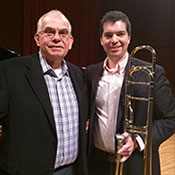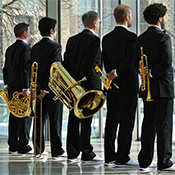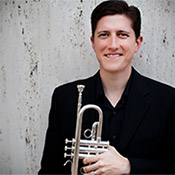
A Fantastic Asset: Associate Principal Trumpet David Cohen
David Lewellen
PUBLISHED
Tagged Under: Brass, MSO Musicians, Trumpet
David Cohen doesn’t think he has the personality to be a trumpet player.
He must be doing something right, since he has been the associate principal trumpet of the Milwaukee Symphony for six seasons. But he doesn’t fit the stereotype of the brash extrovert.
“That’s been a funny thing about my life,” he said. “I’m a mild-mannered, soft-spoken person.” It does fit the part of his role that involves playing third trumpet most of the time. But on the pieces that principal trumpet Matthew Ernst doesn’t play, Cohen is the guy. Switching back and forth is “like a roller coaster,” he said. “It’s one of the most challenging things about the job, going from a supporting role to a leadership role.”
On this week’s program, Cohen gets a chance to do both, in a sense, with Respighi’s The Pines of Rome. The last movement features six extra brass players, offstage or in the hall, evoking the sound of ancient Roman legionaries. Cohen, instead of sitting in the orchestral trumpet section, will be playing the lead in the offstage band. “To come in cold on a solo part after the orchestra has been playing is stressful,” he said. “That’s its own challenge.”
“David’s a fantastic asset,” Ernst said. “He plays with a gorgeous sound, and any time I need to be spelled, he’ll spell me. Anything I ask him, he’ll do it. We play very well together. Our concepts are very aligned.”
Playing offstage solos is part of Cohen’s job description, and it’s not easy. He has to play slightly ahead of the beat, to allow for the extra distance his sound travels, and “everything starts to sound flat, so you have to think bright in order to meet the pitch of the orchestra.”
Respighi wrote the offstage band for six “buccine,” or ancient Roman horns, but since The Pines of Rome premiered in 1924, almost every conductor and orchestra has had to make their own decision about what the modern equivalents will be. For this week’s performance, Cohen will play his normal trumpet, with other musicians playing three flugelhorns and two euphoniums.
Growing up in Evanston, Ill., Cohen was obsessed with the “outrageously high level of brass playing” in Chicago, “and I wanted to keep going and get better.” He attended Northwestern University in his hometown, and upon graduation won the principal trumpet job in the Tucson Symphony. In student orchestras, he had not been exposed to the full classical repertoire, and Tucson was a relatively low-pressure way to learn on the job. But although he liked Arizona, “I didn’t realize how much I loved the Midwest until I moved away.”
Now he is back, an hour and a half from his family. “I love Milwaukee,” he said. “It’s like a smaller, more livable version of Chicago.” He lives within walking distance of the Marcus Center and likes to go running along the lake and on the Oak Leaf Trail, which he called “one of my favorite places in the world.”
Cohen filled the spot opened by the retirement of Dennis Najoom, who played with the MSO for 43 years. Since then, the two have become friends: “If something challenging comes up, I’ll call and ask him, about equipment or about what we’ve done in the past.” Executive director Mark Niehaus, the MSO’s former principal trumpet, is another good resource. Niehaus was promoted in 2012, one year before Cohen arrived but several years before Ernst permanently filled the principal seat. That meant that Cohen used to play a lot more first trumpet than he does now, which was a “baptism by fire.”
He teaches privately and at DePaul University in Chicago. When he’s helping a student prepare for an audition, he emphasizes planning and preparation, but “make it feel like a performance. Make it feel like you’re telling a story.” Having served on audition committees himself, he said, “It’s very interesting being on the other side. It’s often so clear who the winner is. It’s whoever succeeds in telling the best story. You can sit there and listen to 50 people, but when that person comes in, you forget that you’re on the committee and just listen, and at the end you realize you haven’t written anything down.”



